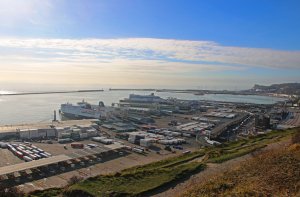In the biggest upgrade of its kind for 14 years, harbour masters at the Port of Dover are overseeing £1.4 million of investment in cutting edge technology to ensure shipping and recreational marine stakeholders continue to have the highest standards of protection and advice available.
Specialists have already installed a new tide gauge - the first of a suite of state-of-the-art environmental monitoring systems that will ultimately give maritime traffic live feeds on sea and weather conditions in the port.
Engineering teams are now looking to create temporary accommodation at Dover’s Terminal Control Building to house vessel traffic services officers while their Port Control facilities are extensively refurbished.
In November, the port will upgrade existing radar equipment on both the Eastern Arm and Admiralty Pier. An additional radar will be installed on the new marina pier facility currently being constructed as part of the Dover Western Docks Revival programme.
These new radars will link to improved CCTV cameras, each equipped with thermal imaging capabilities that will give Port Control Officers greater ability to track, target, record and intercept vessels navigating dangerously.
Steve Masters, the Port of Dover’s Harbour Master, said: "This is a major investment in port maritime safety which will serve the UK, seafarers and passengers for years to come. We have been fastidious in keeping our existing systems effective and fully operational, but the latest work will take the port’s maritime safety management compliance abilities to a whole new level, in line with continued industry best practice guidance from the UK’s Port Marine Safety Code.
"The work we are doing not only benefits those who use the sea, but also supports households and businesses across the country who rely on a smooth, safe operation in Dover to facilitate the movement of 17 percent of the UK’s entire trade in goods, worth £122 billion to the economy."
There were 1,760 commercial shipping, 36,331 ferry and around 9,500 leisure craft movements through the port during 2017.
During this period, the port registered a significant drop in safety incidents within its main operational areas. Ferry incidents fell by 16 per cent (25 in 2016 compared to 21 in 2017), commercial shipping incidents were down by 25 per cent (eight in 2016 compared to six in 2017) and recreational boating saw a fall of 53 per cent (152 incidents in 2016 to 71 in 2017).
In total, there were 266 safety incidents of varying degrees last year, ranging from communications issues (where leisure craft failed to notify port control of their intentions) to a man overboard on a construction barge.
The drop in incidents coincided with a major port navigational awareness drive which saw the maritime safety team publish a vessel traffic services guide, produce a public safety film on navigating the Port of Dover, hold safety workshops with local marine stakeholders, and invest £10,000 in new safety signage for bathers and beach users.
Port of Dover invests £1.4m in sea safety systems overhaul
Sunday, 15 July 2018
More news...
- DDC shortlisted for Keep Britain Tidy's Network AwardsThursday, 15 December 2022Dover District Council has been shortlisted for a Keep Britain Tidy Local Authority Network Award. The 'Great British Spring Clean Award 2023' recognises promotion, engagement, and delivery of The Great British Spring Clean Campaign.DDC shortlisted for Keep Britain Tidy's Network Awards
- Dover choir to give Christmas concert at St Paul's Roman Catholic ChurchMonday, 28 November 2022
 An award-winning Dover choir will be giving their Christmas concert next month - the first with their new musical director.Dover choir to give Christmas concert at St Paul's Roman Catholic Church
An award-winning Dover choir will be giving their Christmas concert next month - the first with their new musical director.Dover choir to give Christmas concert at St Paul's Roman Catholic Church - The Big Dover Jobs & Skills FairThursday, 6 October 2022Over 600 jobs will be on offer along with a host of skills and training opportunities at the Big Dover Jobs & Skills Fair at the Port of Dover's Cruise Terminal Two on Tuesday, 18 October.The Big Dover Jobs & Skills Fair
